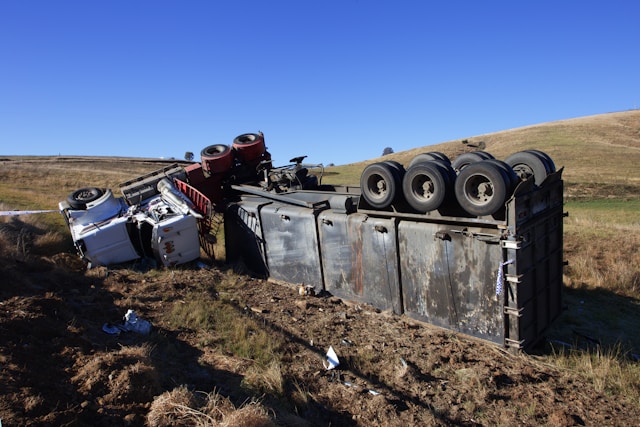Quick Summary for Busy Readers
Truck accident claims are surrounded by myths that can hurt victims’ chances of fair compensation. Common misconceptions include:
- “Trucking companies will offer fair settlements” – Insurers often lowball victims.
- “Only the truck driver is liable” – Multiple parties (employers, manufacturers, etc.) may share fault.
- “Minor injuries aren’t worth claiming” – Hidden long-term costs (e.g., chronic pain) make legal advice critical.
- “Claims always go to court” – Most cases settle out of court.
- “You have unlimited time to file” – Statutes of limitations vary by state (e.g., 2 years in Texas).
This guide debunks 10 major myths, explains legal complexities, and provides actionable steps for victims.
Introduction: Why Truck Accident Myths Matter

Truck accidents cause 4,119 fatalities annually in the U.S. (NHTSA). Victims face medical bills, lost wages, and emotional trauma, yet myths often prevent them from seeking justice. Misinformation—spread by insurers, pop culture, or well-meaning friends—can lead to:
- Underpaid settlements
- Missed deadlines
- Unclaimed damages
This article separates fact from fiction, empowering victims with knowledge.
Myth #1: Trucking Companies Automatically Offer Fair Compensation
Reality: Insurers prioritize profits. A study by the American Association for Justice found that trucking insurers routinely deny or undervalue claims.
Why It’s False:
- Lowball tactics: Insurers may offer quick settlements before victims grasp their injuries’ full impact.
- Complex valuations: Claims involve medical costs, lost wages, pain/suffering, which insurers downplay.
“Insurance adjusters work for the company, not you. Their goal is to save money, not help you.” — Finch McCranie LLP
Action Step: Consult a truck accident attorney before accepting any offer.
Myth #2: Only the Truck Driver Is Liable
Reality: Multiple parties can share liability, including:
| Party | Potential Negligence |
|---|---|
| Trucking Company | Poor maintenance, violating FMCSA hours-of-service rules |
| Manufacturer | Defective brakes/tires (see NHTSA recalls) |
| Loading Contractor | Improper cargo loading causing rollovers |
Example: A 2023 crash in Texas involved a faulty trailer hitch—the manufacturer was sued alongside the driver.
Key Resource: FMCSA Regulations for trucking safety standards.
Myth #3: Minor Injuries Don’t Require Legal Help
Reality: “Minor” injuries like whiplash can lead to chronic pain or degenerative disc disease.
Hidden Costs:
- Delayed symptoms: Concussions may surface weeks later.
- Insurance pushback: Insurers argue minor injuries don’t merit compensation.
Case Study: A victim with “minor” back pain later needed $50,000 in spinal surgery—proving early legal intervention matters.
Myth #4: Claims Always Go to Court
Reality: 90% of truck accident claims settle out of court 5.
Settlement vs. Trial
| Factor | Settlement | Trial |
|---|---|---|
| Time | 6–12 months | 2+ years |
| Cost | Lower legal fees | High court costs |
| Control | Both parties negotiate | Jury decides |
Tip: An attorney can negotiate higher settlements without litigation.
Myth #5: You Have Plenty of Time to File
Reality: Statutes of limitations vary:
| State | Deadline | Exceptions |
|---|---|---|
| Texas | 2 years | Discovery rule for hidden injuries |
| California | 2 years | Government trucks: 6 months |
Resource: State-by-State Guide to filing deadlines.
Myth #6: Truck and Car Accidents Are Identical
Key Differences:
- Severity: Trucks weigh 20–30x more, causing catastrophic injuries.
- Regulations: Truckers must follow FMCSA rules (e.g., logbooks, drug testing).
- Insurance: Trucking policies cover $1M+, but insurers fight harder to limit payouts.
Myth #7: Quick Settlements Are Best
Insurer Tactics:
- Early offers: $15,000 may seem fair until you need lifelong physical therapy.
- Signing away rights: Accepting a settlement waives future claims.
Quote:
“Once you sign, you can’t ask for more—even if your injury worsens.” — Hauptman & O’Brien
Myth #8: All Lawyers Are Too Expensive
Reality: Most attorneys work on contingency fees (no win, no fee).
Fee Breakdown:
- Typical rate: 33–40% of the settlement.
- Upfront cost: 0(vs.hourlyratesof0(vs.hourlyratesof300+/hr).
Myth #9: Insurance Covers All Damages
Policy Limits:
- Minimum coverage: $750,000 for interstate trucks (FMCSA).
- Real costs: Severe crashes can exceed $5M in medical bills.
Solution: Sue negligent parties (e.g., manufacturers) for additional compensation.
Myth #10: You Can Handle the Claim Alone
Why It’s Risky:
- Evidence preservation: Black box data disappears in 30 days.
- Legal loopholes: Insurers exploit unrepresented victims.
Resource: Find a DOT-certified attorney via American Association for Justice.
Conclusion: Fight for Your Rights
Truck accident victims deserve full compensation. Don’t let myths:
- Shortchange your settlement
- Let negligent parties off the hook
Next Steps:
- Document everything (photos, medical records).
- Consult a lawyer—most offer free case reviews.
- Act fast—deadlines loom.
“The truth is, trucking companies have teams of lawyers. You need your own.” — Lapeze & Johns
Frequently Asked Questions
1. How Long Do I Have to File a Truck Accident Claim?
The statute of limitations varies by state, but most give you 2 years (e.g., Texas) or 3 years (e.g., New York). However, evidence like black box data can disappear in 30 days, so act fast.
2. Can I Sue the Trucking Company, Not Just the Driver?
Yes! Under FMCSA regulations, trucking companies can be liable for negligent hiring, poor maintenance, or violating hours-of-service rules. A lawyer can help identify all at-fault parties.
3. What If the Insurance Offer Seems Too Low?
Insurers often lowball victims—especially those without lawyers. Never accept a settlement before calculating future medical bills and lost wages. Consult a truck accident attorney for a fair evaluation.
4. Do I Need a Lawyer for a Minor Injury Claim?
Even “minor” injuries (e.g., whiplash) can lead to chronic pain. Insurance companies may deny claims, so having a lawyer ensures you get full compensation. Most work on a contingency fee, meaning no upfront costs.
5. What Evidence Is Crucial for a Strong Truck Accident Claim?
Critical evidence includes:
- Police reports (NHTSA crash reporting)
- Black box data (records speed, braking, etc.)
- Driver logs (to check FMCSA violations)
- Witness statements & medical records
The sooner you preserve evidence, the stronger your case.
External Links Used:

